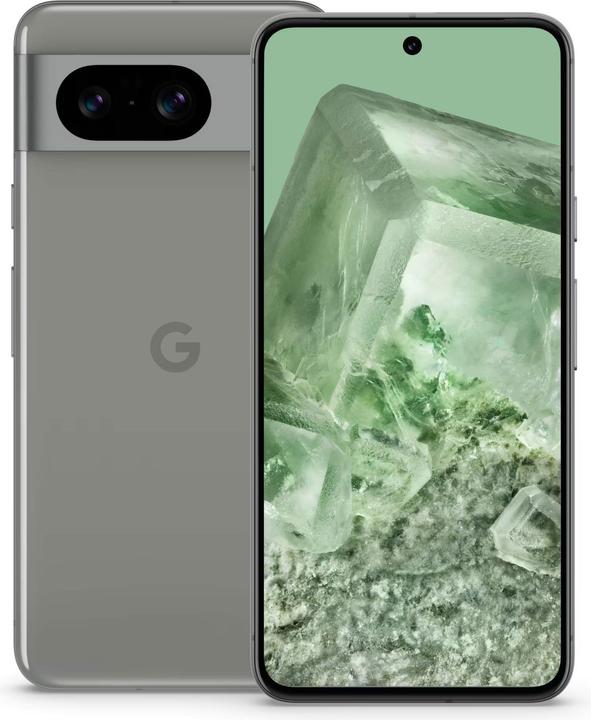
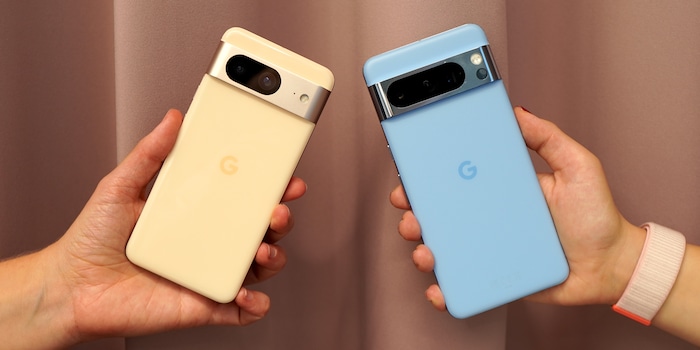
First hands-on: This is how the Google Pixel 8 feels
The matte back remains fingerprint-free, the screen shines brightly and the photo tricks are surprising. Here are our first impressions of the Google Pixel 8 and Pixel 8 Pro.
Important first of all: This is not yet a test, but a first impression from a first hands-on at the market launch. A detailed review will follow.
It took eight years until the first Pixel launch event in Zurich. Now Google's smartphones and watches are officially available in Switzerland - as well as throughout Europe. And the hands-on after the keynote allowed Michelle Brändle and me to try out the Pixels before the official market launch on 12 October.
Design little changed, screen visibly brighter
What is immediately noticeable: The Pro has a different back to the normal Pixel 8. The glass is matt on the more expensive model and also appears slightly rougher. This has two advantages: It is less slippery and prevents fingerprints.
I held a blue Pixel 8 Pro in my hand for almost an hour. There was still no dirt visible on the back. On the Pixel 8 in green-brown (called "Hazel"), on the other hand, the marks are clear after just a few minutes.
If you already own a Pixel 7, you have no reason to switch to the new model, at least from a design perspective. Despite many changes in detail, the new generation looks very similar to the last one. And that's not a bad thing: the Pixel devices have their own design language that stands out from the crowd. My first impression: they are stylish and high-quality.
The most instantly recognisable improvement is the screen. It's now completely flat and no longer stretches over the edges. And above all, it is much brighter - which is immediately noticeable. In normal operation, the 8 Pro delivers a maximum of 1600 nits, compared to 1000 nits for its predecessor. The peak brightness is as high as 2400 nits, which means Google even overtakes the iPhone Pro Max (2000 nits) and the Samsung S23 Ultra (1750 nits). The normal Pixel 8 is also doing very well with 1400 to 2000 nits.
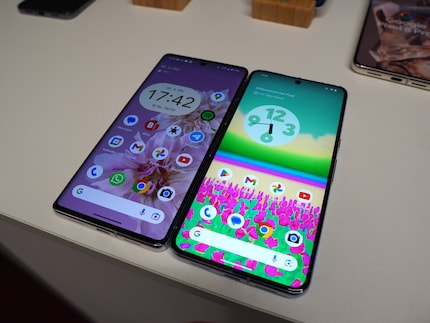
Source: Lorenz Keller
The colours are less impressive. Google seems a little less bold here from year to year. Both versions are available in a dark black, the highlight of the Pro is the matt blue, while the normal Pixel 8 comes in a rose colour. The white and brown versions look a little washed out.
The Pixel 8 is small and compact
The Pixel 8 is 0.1 millimetres thicker than the Pro model. And since the screen measures only 6.2 inches instead of 6.7 inches, but the camera module is similarly chunky, the small Google smartphone looks like a compact but massive bar. Nevertheless, the Pixel 8 is comfortable to hold and is an option for anyone who doesn't want a large smartphone.
You can find a comparison of the two models in the table. You can also use most of the software features on the cheaper model. However, you will have to do without the Pro mode in the camera app, in which you can set the aperture or ISO values manually. This is only available in the Pixel Pro.
You can also find more details on the features and specifications here in the article on the market launch.
Tried out the special effects
What is of course exciting are the new software features that Google has programmed especially for the Pixel devices. Some are already available, others, such as the "Magic Editor", will come later with an update.
Temperature measurement: This sensor is only installed in the Pro directly under the LED flash and sends the data to a separate app. To measure the temperature, you have to get close to a surface, almost touch it. It then shows you, for example, how cold the beer is, how hot the iPhone 15 is or the surface temperature of the skin. In the medium term, a real thermometer function will be added. By preselecting the material category (glass, wood, metal, fabric, etc.), the measurement should become even more precise, according to Google. Incidentally, this works from -20 to +150 degrees Celsius. Outside this range, the measurement is inaccurate.
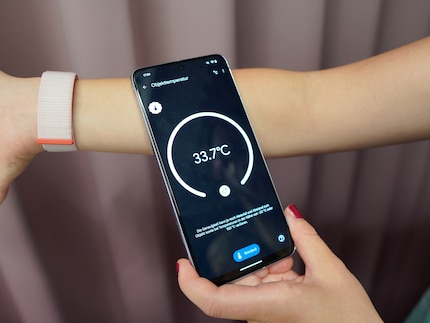
Source: Lorenz Keller
Magic Audio Eraser: If you click on a video in the Google Photos app, you can filter out background noise. The audio track is analysed and divided into individual sections. You can then use sliders to determine whether noise or other disturbing sounds are filtered out. First impression: The app doesn't work miracles, but the chatter in the hands-on area has been significantly reduced so that the person in the foreground is easier to understand. Of course, you could also do this with a professional sound programme, but it's cool to do it so quickly and easily on your mobile.
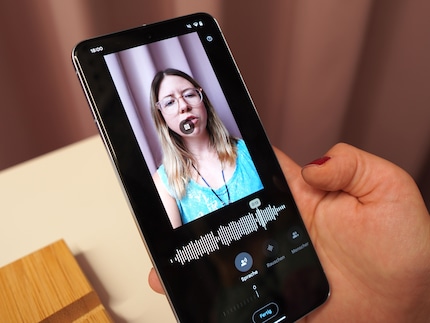
Source: Lorenz Keller
Best shot: A group photo at an event like this is a must. But of course not everyone is looking at the camera - and not everyone is laughing in sync. None of the five or six shots are perfect. The Photos app will search for the faces in all the photos if you wish. You can now select the facial expression for each person. This worked really well the first time I tried it out when the people weren't moving much. However, if the posture changes too much, the "superimposed" face can quickly look artificial.
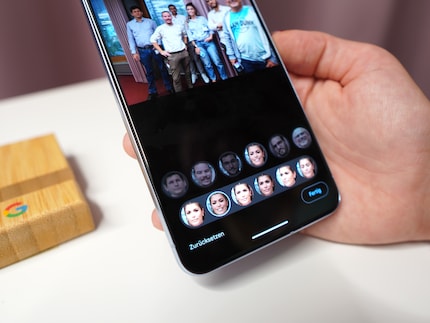
Source: Lorenz Keller
The first impression is a promise
The new Pixel phones make a good impression and I'm looking forward to trying them out in everyday life. It's not just design and "magical" software tricks that count, but also battery life and camera quality.
How long does the battery last? How good is the optical fingerprint reader? How much better are the cameras? We will try all of this out in detailed tests. What are you particularly interested in about the Pixel 8, Pixel 8 Pro or Pixel Watch 2? Let me know in the comments!
Cover photo: Lorenz Keller
Gadgets are my passion - whether you need them for the home office, for the household, for sport and pleasure or for the smart home. Or, of course, for the big hobby next to the family, namely fishing.
From the latest iPhone to the return of 80s fashion. The editorial team will help you make sense of it all.
Show all